Vinyl sheet flooring has become a popular choice for many homeowners and businesses alike due to its reputation for durability and ease of maintenance. Among the many questions that prospective buyers have, the most pertinent is often: “Is vinyl sheet flooring waterproof?”
This concern is especially relevant in spaces prone to moisture, such as kitchens, bathrooms, and basements. In this guide, we will dive into the waterproof characteristics of vinyl sheet flooring, ensuring that you can make an informed decision for your flooring needs with confidence.
The appeal of vinyl sheet flooring in contemporary home design has surged, owing much to its water-resistant nature and versatile appearance.
Its capacity to mimic the aesthetics of more expensive flooring options like hardwood and stone without the same cost or upkeep has made it a go-to for budget-conscious homeowners looking for style without compromise.
Moreover, the wide variety of patterns and colors available opens up creative possibilities for interior designs ranging from classic to modern, ensuring a fit for any decorative theme.
Composition of Vinyl Sheet Flooring

Vinyl sheet flooring is crafted from a blend of synthetic materials, primarily polyvinyl chloride (PVC), which lends it a flexible yet durable nature. The flooring’s layers consist of a core, a decorative image, and a protective top coat each serving a specific purpose.
The core gives the flooring its strength and resilience, while the decorative image layer provides a realistic look of wood, stone, or an array of patterns.
The top protective layer, often a wear layer with a urethane coating, acts as a barrier against scratches, dents, and moisture, contributing to the flooring’s waterproof capabilities and overall longevity.
This composition allows the vinyl sheet to resist water penetration and makes it an ideal choice for areas susceptible to spills and humidity.
Layered Structure of Vinyl Sheet Flooring
The innovative layered structure of vinyl sheet flooring is the key to its performance and versatility. Typically, this type of flooring is comprised of the following:
The Backing Layer:
This is the foundational layer that provides the sheet with structural strength and stability. Often made from felt or fiberglass, the backing layer ensures that the flooring lays flat and remains dimensionally stable against the subfloor.
The PVC Core:
At the heart of vinyl sheet flooring is a dense, waterproof PVC core. This layer is responsible for the cushioning underfoot feel and contributes to the floor’s durability and resistance to ripping, tearing, and gouging.
The Decorative Layer:
Above the core is the decorative layer, which boasts high-resolution graphics that mimic the appearance of natural materials such as wood and stone or present distinctive patterns. This is the layer that primarily defines the aesthetic appeal of the flooring.
The Wear Layer:
The topmost layer is the wear layer, which protects the floor from everyday wear and tear. It can be enhanced with urethane to resist scratches, scuffs, and stains, making maintenance and cleaning simple.
The thickness of the wear layer is a significant factor in determining the floor’s longevity and suitability for different levels of foot traffic.
Together, these layers create a flooring option that is not only beautiful but also practical for a wide range of environments, from residential to commercial spaces.
Waterproof Characteristics
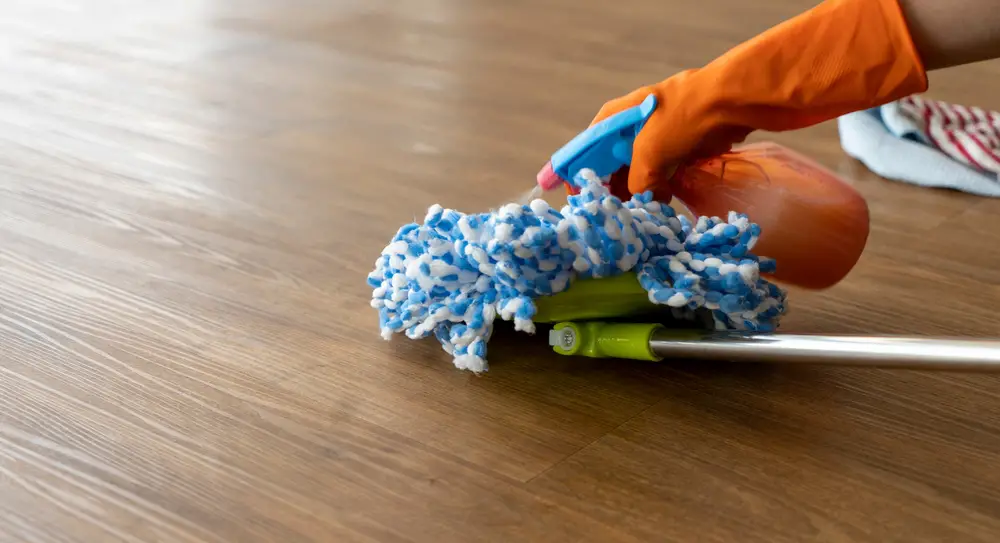
Vinyl sheet flooring’s innate waterproof characteristics stem from its PVC core and seamless installation. The PVC, or polyvinyl chloride, is a synthetic plastic renowned for its resistance to moisture penetration.
Unlike other flooring types, such as hardwood or laminate that may absorb water and swell, a vinyl sheet’s PVC core remains impervious to moisture due to its nonporous nature.
This makes it an ideal choice for rooms susceptible to spills and moisture like kitchens, bathrooms, and basements.
Furthermore, the integration of the wear layer serves as a secondary barrier against water damage.
Often treated with a water-resistant urethane coating, the wear layer not only endows vinyl with a defense against scratches and dents but also acts to repel water, ensuring that the decorative layer below remains unaffected by moisture.
In terms of installation, vinyl sheet flooring typically comes in large rolls which, when cut to size and installed, leave very few seams, if any.
Seamless installation greatly reduces the potential for water to seep between gaps, a common issue with tiles or plank-style flooring systems. The fewer the seams, the lower the risk of water infiltration, thus bolstering the waterproofing efficacy of vinyl sheet flooring.
When considering long-term exposure to moisture, vinyl flooring outperforms many of its competitors. It does not harbor mold or mildew since it provides no organic material for growth, unlike certain types of carpets or wood flooring.
In-depth care, including occasional mopping with mild cleaners and avoiding standing water, can preserve the waterproof integrity of vinyl sheet flooring for years to come.
Comparison with Hardwood Flooring
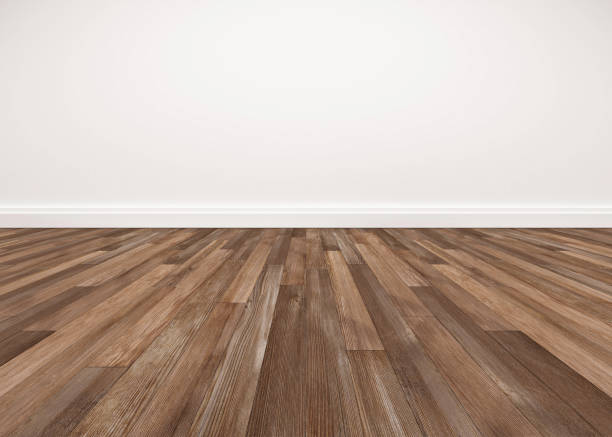
When it comes to water resistance, hardwood flooring stands on the opposite end of the spectrum in comparison to vinyl.
Hardwood floors are highly susceptible to water damage; prolonged exposure to moisture can cause warping, swelling, and discoloration. In contrast, vinyl sheet flooring offers a robust solution against moisture, maintaining its integrity even under damp conditions.
Comparison with Laminate Flooring
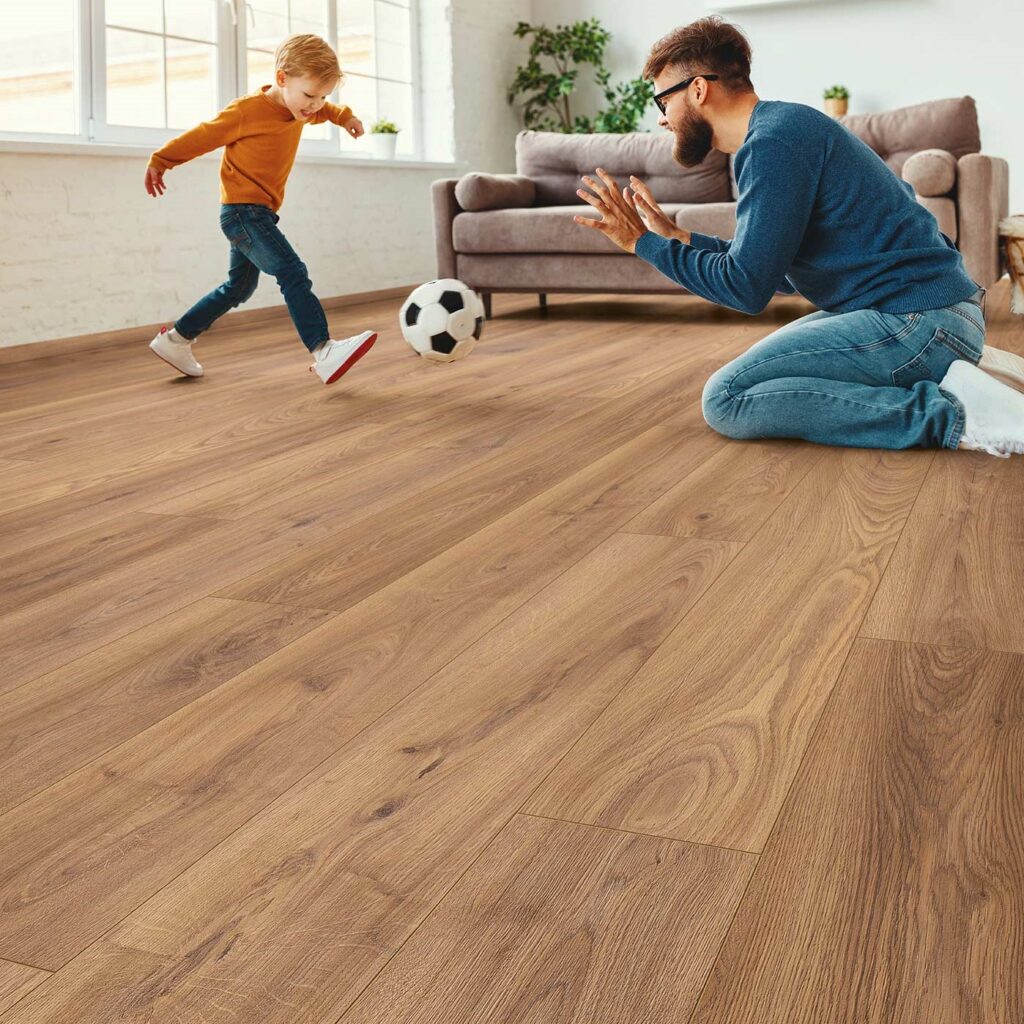
Laminate flooring, while more water-resistant than hardwood, still falls short of the superior moisture barrier that vinyl sheet flooring provides.
Laminate is composed of layers, with the top layer offering some resistance to spills. However, standing water can penetrate the seams and cause the core board to swell, leading to irreversible damage over time.
Comparison with Tile Flooring
Ceramic or porcelain tile flooring offers excellent water resistance and, in terms of preventing water absorption, can be comparable to vinyl.
Nevertheless, the grout lines between tiles can become a weak point, potentially allowing moisture to seep in if not properly sealed. Tiles can also be cold to the touch and hard underfoot, while vinyl offers more warmth and comfort.
Comparison with Carpet
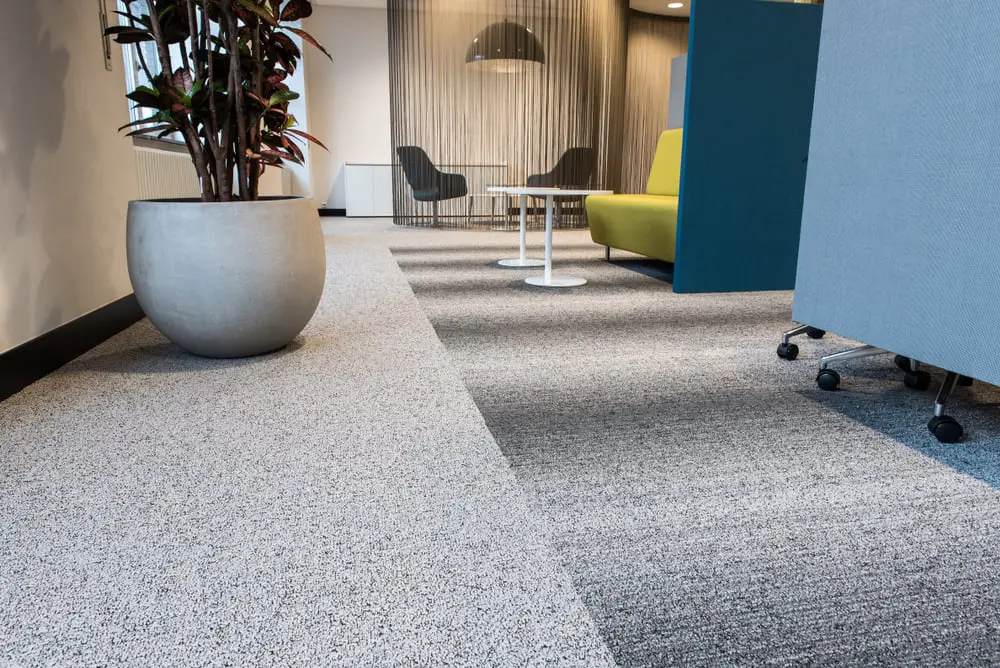
Carpet is the least water-resistant flooring option available. It readily absorbs liquids, leading to potential staining, odor issues, and the growth of mold and mildew if moisture is not swiftly and thoroughly removed.
Vinyl’s impenetrability to moisture and ease of cleaning provide a stark contrast to the demanding maintenance needs of carpets when dealing with spills or damp environments.
Related Topic: A Guide to Installing Vinyl Sheet Flooring Over Carpet
Comparison with Cork Flooring
Cork flooring, while more water-resistant than hardwood, still requires sealing to protect against water damage. Over time, exposure to moisture can cause cork to warp or discolor.
Comparatively, vinyl sheet flooring needs no additional sealing and its resilience to water exposure remains consistent, illustrating its advantages over cork in wet or humid conditions.
Benefits of Waterproof Flooring
- Durability: Waterproof vinyl sheet flooring is renowned for its resilience and ability to withstand heavy foot traffic without deteriorating over time.
- Low Maintenance: It requires minimal upkeep, is easy to clean, and does not necessitate the laborious treatments that other flooring types may need.
- Versatility: Comes in a wide range of patterns and designs, allowing homeowners to achieve the aesthetic of wood, stone, or other materials with the added benefit of water resistance.
- Comfort: Provides a softer surface underfoot compared to tile or stone, offering a level of cushioning that contributes to comfort and safety.
- Cost-Effective: Often more affordable than natural materials, providing the look and feel of luxury without the hefty price tag.
- Moisture Resistance: Exhibits superior resistance to spills, humidity, and even flooding, making it an ideal choice for bathrooms, kitchens, and basements.
- Health & Hygiene: Discourages the growth of mold and mildew as it does not absorb moisture, contributing to better indoor air quality and hygiene.
- Installation Ease: This can be laid down with relative ease, often without the need for professional installation which can save on costs.
- Subfloor Compatibility: Capable of being installed over various types of subfloors, even those that aren’t perfectly level or have minor imperfections.
Possible use cases in high-moisture areas
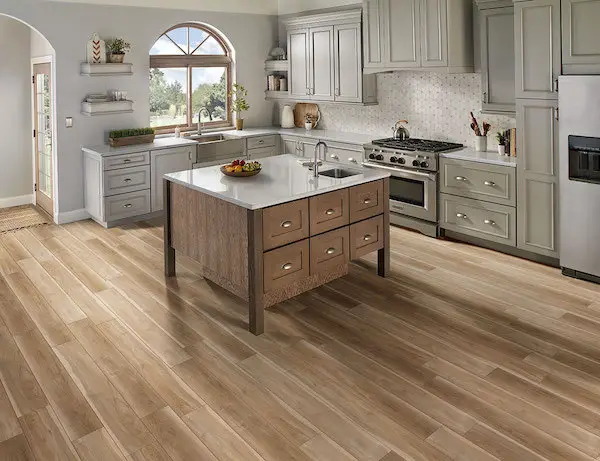
Areas of a home that are exposed to high levels of moisture, such as bathrooms and kitchens, can significantly benefit from the installation of waterproof flooring.
In the bathroom, waterproof vinyl flooring can handle the constant humidity and direct water exposure from showers and baths without warping or developing mold.
In kitchens, this flooring can withstand spills from cooking, sink overflows, and splashes with quick and easy cleanup, maintaining its integrity and appearance over time.
The slip-resistant properties also enhance safety in environments where wet floors are common, making waterproof flooring a practical and stylish choice for these demanding spaces.
Installation and Maintenance
Installation Guidelines
Installing vinyl sheet flooring to maximize its water resistance involves careful preparation and precise execution. Follow these steps to ensure optimal performance:
Subfloor Preparation: Ensure that the subfloor is clean, dry, level, and smooth. Any bumps or gaps can cause imperfections in the surface of the vinyl flooring.
Measure Accurately: Take precise measurements of the room where the flooring will be installed to ensure the vinyl sheet covers the entire space without any gaps.
Acclimatization: Allow the vinyl sheet to acclimate to the room’s temperature for at least 24 hours before installation. This prevents expansion or contraction post-installation.
Cutting to Fit: When cutting the vinyl to fit your space, leave a slight excess that can be trimmed down for a perfect fit against the walls and fixtures.
Adhesive Application: Use a full-spread adhesive recommended by the flooring manufacturer to prevent water from seeping beneath the vinyl. Ensure the adhesive is evenly spread for a secure hold.
Sealing Seams: If your installation requires seams, use a seam sealer to waterproof the joints and prevent moisture ingress.
Final Trimming: Once the sheet is laid out and bonded to the adhesive, carefully trim any excess material for a clean, finished look.
Maintaining the Waterproof Integrity Over Time
Maintaining the waterproof quality of your vinyl sheet flooring is crucial for long-term satisfaction and durability. Regularly clean the surface with a damp mop and a mild cleaner to prevent any buildup of dirt or debris that could wear down the finish.
Avoid using abrasive scrubbers or harsh chemicals that could damage the flooring. Check and reseal seams periodically, and address any spills or moisture immediately to prevent water damage.
Protect the flooring from heavy furniture with felt pads and consider employing area rugs in high-traffic zones to minimize wear and tear.
An error occurred during generation. Please try again or contact support if it continues.
Related Topics:
Conclusion
So, vinyl sheet flooring stands out as a superior choice for areas susceptible to moisture due to its robust waterproof properties. The unmistakable benefits of durability, ease of installation, and minimal upkeep make it an attractive option for spaces such as bathrooms, kitchens, and basements.
By following the proper installation and maintenance guidelines, homeowners can revel in the peace of mind that comes with a reliable and long-lasting flooring solution.
So, whether you’re renovating or building anew, consider the practicality and protective qualities of vinyl sheet flooring to create a space that is as functional as it is aesthetically pleasing.
FAQs
Can vinyl sheet flooring be installed over existing tiles or laminate?
Absolutely! Vinyl sheet flooring can be installed over various types of subflooring, including existing tiles or laminate, as long as the surface is smooth, flat, and clean. It’s essential to repair any damage or unevenness in the existing floor to prevent imperfections from showing through the vinyl.
How long does vinyl sheet flooring typically last?
With proper care and maintenance, vinyl sheet flooring can last between 10-20 years. Factors that influence its longevity include the quality of the material, the amount of foot traffic, and adherence to maintenance recommendations.
Is vinyl sheet flooring pet-friendly?
Yes, vinyl sheet flooring is known for being pet-friendly. It is resistant to scratches and stains, which is ideal for households with pets. Plus, it’s easy to clean in the event of accidents, and its texture provides traction for pets on the move.

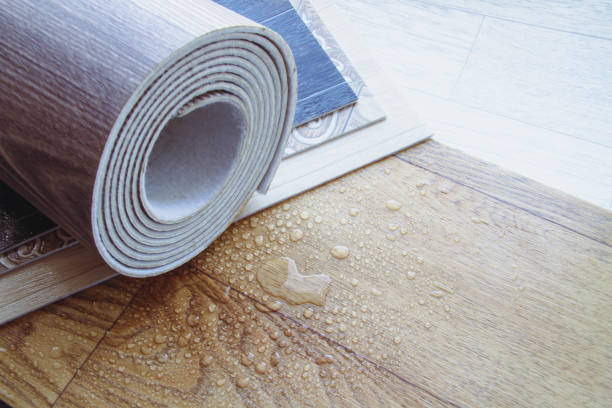
1 thought on “Is Vinyl Sheet Flooring Waterproof?”